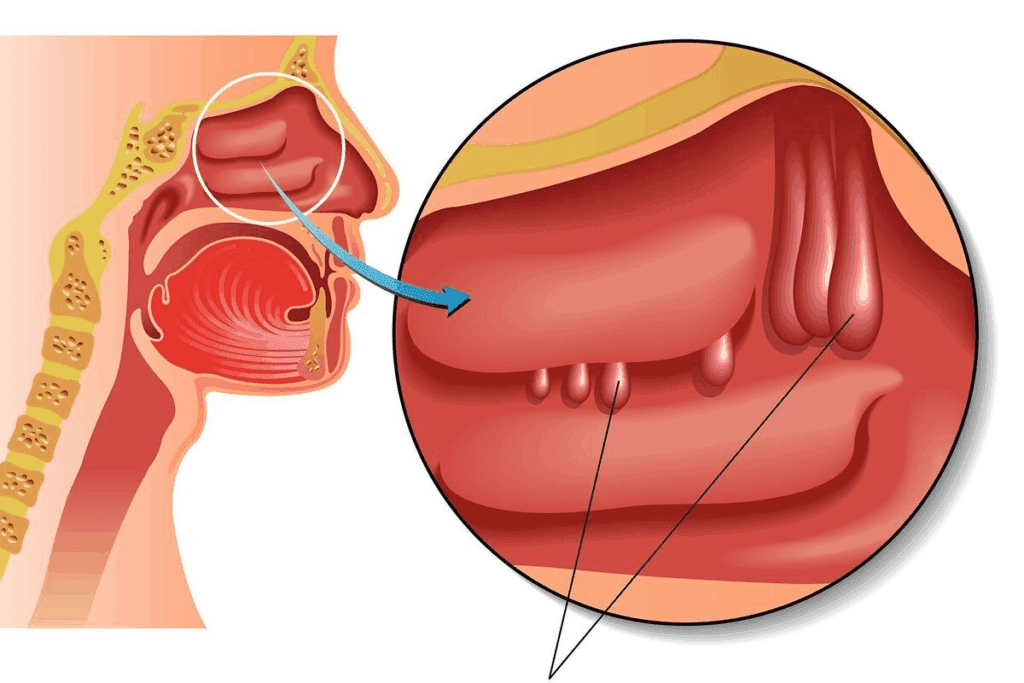Last Updated on October 31, 2025 by Saadet Demir

Do you wake up with a dry mouth, scratchy throat, and nasal congestion? This often happens in cold months or after being in dry places. Dry sinus infections can really hurt, affecting millions every year.
At Liv Hospital, our team is all about top-notch, patient-focused care for dry sinus symptoms. We use the newest medical methods and care with kindness to tackle dry sinus problems.
It’s key to know and tackle dry sinuses symptoms to better your life. Our team is here to help you ease these annoying symptoms.
How to relieve dry sinus infection symptoms, which may include thick, difficult-to-clear mucus, using targeted hydration.

Dry sinus infections happen when the sinuses don’t have enough mucus. Mucus traps bacteria and keeps the sinuses moist. Without enough mucus, the sinuses can dry out, causing nose and airway dryness.
When the sinuses are dry, they’re more likely to get irritated and infected. Without mucus, dry air can irritate the sinus lining, causing pain and inflammation. This can get worse in low humidity and cold weather.
Dry sinuses also cause symptoms like nasal congestion, facial pain, and a reduced sense of smell. Knowing these symptoms helps in diagnosing and treating dry sinus infections.
Dry sinuses and regular sinus infections have different causes and symptoms. Regular sinus infections come from bacteria or viruses, while dry sinuses are due to a lack of mucus. Knowing this helps choose the right treatment.
Characteristics | Dry Sinuses | Regular Sinus Infections |
Cause | Lack of mucus production | Bacterial or viral infection |
Primary Symptoms | Dryness, nasal congestion | Purulent discharge, facial pain |
Treatment Approach | Humidification, saline rinses | Antibiotics, decongestants |

Knowing the signs of dry sinuses is key to feeling better. Dry sinuses can make you feel uncomfortable every day. If left untreated, they can cause mucus to thicken, trapping harmful bacteria.
Dry sinuses can cause several physical symptoms, including:
While the symptoms mentioned can be uncomfortable, they can also be indicative of a more serious issue – a dry sinus infection. If you experience persistent or severe symptoms such as increased sinus dryness pain, it’s essential to seek medical attention. A dry sinus infection occurs when the dryness allows bacteria to infect the sinus cavities.
Some warning signs that your symptoms may indicate a dry sinus infection include:
Recognizing these symptoms early can help in getting the right treatment and preventing complications.
Many things can lead to dry sinus infections. This includes dry air and certain medicines. Knowing what causes them helps in preventing and treating them.
Environmental factors are key in causing dry sinus infections. Dry air, common in cold weather or indoors, dries out sinuses. Also, pollutants and allergens can make sinus dryness worse.
Climate and air quality affect sinus health. People in dry places or areas with bad air may have drier sinuses. This is because of less moisture and more irritants.
Some medical issues make you more likely to get dry sinus infections. Allergies, colds, and flu often cause congestion and dryness. Conditions like rhinitis and sinusitis also lead to dry sinuses.
It’s important to manage these conditions to avoid dry sinus infections. This might mean treating the condition or finding ways to lessen its impact on sinuses.
Some medicines can dry out your sinuses. This includes decongestants, antihistamines, and some blood pressure medications. They can either reduce nasal secretions or cause congestion.
Talking to a healthcare provider about side effects is a good idea. If you’re on medication and have dry sinuses, changing your treatment might help.
Knowing who is at risk can help prevent dry sinus infections. Dry sinuses can hit anyone, but some are more likely to get them. This is because of certain factors.
As we get older, our sinuses change. This can make them less effective. Older adults are more likely to have dry sinuses, mainly in dry air.
This is because aging makes our sinuses thinner and less able to clear out mucus.
Some key age-related risk factors include:
Some health issues can make you more likely to get dry sinuses. These include:
People with these conditions often have dry sinuses and sore throat more often. It’s important to manage these conditions to avoid dry sinus infections.
Also, dry air can make dry sinus symptoms worse. This is common in winter or in air-conditioned places. Using humidifiers and saline nasal sprays can help.
By knowing these risk factors, we can protect our sinuses. We can do this by keeping our environment healthy, managing our health, and using the right nasal care products.
To ease dry sinus symptoms, try hydration, nasal irrigation, and steam therapy. These methods together can greatly reduce discomfort and pain from dry sinuses.
Drinking enough water is key to thinning mucus and avoiding blocked sinuses. Aim for at least eight glasses of water daily, more if you’re dealing with dry sinuses.
Other hydrating drinks like herbal teas and clear broths are also good. Avoid drinks that dry you out, like caffeine and alcohol, as they can make symptoms worse.
Nasal irrigation is a great way to ease dry sinus symptoms. Using a saline solution to rinse your nasal passages moisturizes and clears out mucus. Use a neti pot or a squeeze bottle with a nasal spray tip for this.
To make the saline solution, mix 1/4 teaspoon of salt and 1/2 teaspoon of baking soda in 8 ounces of warm water. Stir until dissolved, then use it to rinse your nasal passages. Do this once or twice a day, based on your symptoms.
Steam therapy is also effective for dry sinus symptoms. Inhaling steam moisturizes the nasal passages and loosens mucus. A simple way is to take a hot shower and breathe in the steam. You can also use a steam humidifier at home to add moisture.
For a more focused approach, create a steam inhalation treatment. Boil water, then remove it from heat and inhale the steam with a towel over your head. Be careful not to burn yourself. Adding eucalyptus oil or menthol to the water can help open up your nasal passages.
For those with dry sinus symptoms, over-the-counter solutions are a good start. Dry sinus infections can be very uncomfortable. But, there are many products to help ease these symptoms.
Saline sprays and rinses are very effective for dry sinuses. They moisturize the nasal passages and make mucus thinner. This makes it easier to breathe.
Saline sprays offer quick relief from dry nose symptoms. You can use them as often as you need. For a deeper clean, try saline rinses with a neti pot or squeeze bottle.
Healthcare experts say saline nasal sprays help humidify the nasal mucosa. They also loosen thick secretions. Regular use can greatly improve sinus health.
Moisturizing gels and ointments add another layer of relief for dry nostrils symptoms. Apply them directly to the nostrils to keep moisture in. Some products also have eucalyptus or menthol to help with congestion.
Choose fragrance-free and hypoallergenic moisturizing gels or ointments. A thin layer before bed can prevent dryness at night.
Humidifiers and vaporizers add moisture to the air. They’re great for dry weather or air-conditioned spaces. They help prevent dry sinuses infection symptoms.
There are many types of humidifiers, like cool mist, warm mist, and ultrasonic. Consider room size, noise level, and maintenance when choosing. Clean them regularly to avoid bacterial growth.
In conclusion, products like saline sprays, moisturizing gels, and humidifiers can greatly help with dry sinus symptoms. By knowing what’s available and using them correctly, you can manage your condition better. This improves your overall sinus health.
Looking for relief from dry sinus infections? Natural remedies can help. They offer a holistic way to ease symptoms and find comfort.
Herbs have been used for ages to fight sinus dryness. Echinacea and Goldenseal boost the immune system. We can take them as teas, capsules, or tinctures.
Slippery Elm is another great herbal remedy. It soothes the mucous membranes, reducing inflammation and aiding healing in the nasal passages.
Essential oils can greatly help with dry sinuses. Eucalyptus oil is a standout because it opens up airways and eases sinus pressure.
Peppermint oil and Tea Tree oil are also beneficial. Peppermint oil eases congestion, while Tea Tree oil fights off infections with its antimicrobial properties.
Changing our diet can also help with dry sinuses. Eating more omega-3 fatty acids, found in fish and flaxseeds, can reduce inflammation.
Drinking plenty of water is key. Also, eating foods high in antioxidants, like fruits and vegetables, boosts our immune system.
Dietary Change | Benefit |
Increased Omega-3 intake | Reduces inflammation |
Staying hydrated | Helps maintain sinus moisture |
Consuming antioxidant-rich foods | Boosts immune system |
By adding these natural remedies to our daily life, we can better manage dry sinus infections. This improves our overall health and well-being.
Dry sinus infections can become serious if not treated. It’s important to get medical help on time. Many cases can be handled with self-care and over-the-counter remedies. But, some need professional help.
See a doctor if you have these symptoms:
These signs might mean a serious infection or complication. This could be a bacterial sinus infection or an abscess. You need to see a doctor right away.
For severe or ongoing dry sinus infections, doctors might suggest:
In some cases, you might need more tests to find what’s causing the dry sinus infections. This could include:
Getting medical help when needed can stop complications and help manage dry sinus infections.
To prevent dry sinus infections, we need to take a few steps. We should make our homes better and follow healthy habits. Knowing what causes dry sinuses helps us keep our sinuses healthy.
Keeping your home right is key to avoiding dry sinus infections. You need the right humidity in your home. Dry air makes sinuses drier.
Using a humidifier is a good idea. It’s great for places with dry air or during winter. The heat from heaters can dry out the air.
There are daily habits that help keep your sinuses safe. Drinking lots of water is very important. It keeps your mucous membranes moist.
Experts say, “Good sinus health comes from controlling your environment and staying clean.”
This way, you not only avoid dry sinus infections but also stay healthy overall.
Each season has its own challenges for your sinuses. Winter air is very dry, and summer air conditioning can also dry out your sinuses.
By using these tips, we can keep our sinuses healthy all year round.
Understanding and tackling dry sinus infections can greatly improve our life quality. It’s key to manage our sinus health and seek medical help when needed. This article has covered the causes, symptoms, and ways to find relief from dry sinus infections.
We’ve talked about the value of staying hydrated, using nasal irrigation, and steam therapy to ease dry sinuses. We’ve also looked at how over-the-counter meds, natural remedies, and preventive steps help keep our sinuses healthy.
To keep our sinuses in good shape, we need to be proactive. This means creating a healthy home environment, following daily habits that protect our sinuses, and knowing when to seek medical help. By doing these things, we can lower the chance of getting dry sinus infections and keep our sinuses healthy.
Dry sinus infections happen when the sinuses get dry and inflamed. This is often because of too little mucus or very dry nasal passages. Unlike regular sinus infections, which are usually caused by germs or viruses, dry sinus infections come from environmental or health issues.
Dry sinuses can make your nasal passages feel dry and sore. You might also feel pain in your face or forehead. It can be hard to breathe through your nose, and you might have a dry, sore throat or feel congested.
Many things can cause dry sinus infections. Environmental dryness, certain medicines, and health conditions are common causes. Air conditioning, dry air, and some medicines like decongestants or antihistamines are often to blame.
Older adults and people with certain health issues are more likely to get dry sinuses. This includes those with autoimmune diseases or respiratory problems. Also, people who work or live in dry places or take certain medicines are at risk.
To ease dry sinus symptoms, try saline sprays or rinses, moisturizing gels, and humidifiers. Drinking lots of water and using steam therapy can also help. These methods can loosen mucus and make your nasal passages feel better.
Natural remedies include herbal solutions like eucalyptus or peppermint. Essential oils, such as eucalyptus or lavender, can also help. Eating foods rich in omega-3 fatty acids or staying hydrated is good for your sinuses too.
If your symptoms are severe or don’t go away, see a doctor. Also, if you have a fever, facial pain, or trouble breathing, get help right away. If you have a health condition or take medicines that might cause dry sinuses, talk to your doctor.
To avoid dry sinus infections, keep your environment moist. Use humidifiers and avoid dry air. Stay hydrated and use saline sprays or rinses daily. Also, try to avoid allergens or irritants, depending on the season.
Yes, dry sinuses can mean you have an underlying condition. This could be an autoimmune disease, respiratory problem, or allergies. If your symptoms are bad or last a long time, see your doctor to check for any hidden issues.
Yes, you can find many over-the-counter solutions. Saline sprays, moisturizing gels, and humidifiers can add moisture to your nasal passages. They help soothe dryness and support your sinuses.
To handle dry sinus symptoms when traveling or in new places, drink plenty of water. Use saline sprays or rinses and consider a portable humidifier or nasal spray. Try to avoid dry air and irritants to ease your symptoms.
American Academy of Otolaryngology—Head and Neck Surgery. (n.d.). Tonsillectomy. Retrieved from https://www.enthealth.org/be_ent_smart/post-tonsillectomy-pain-management-for-children-education-for-caregivers/
Subscribe to our e-newsletter to stay informed about the latest innovations in the world of health and exclusive offers!
WhatsApp us